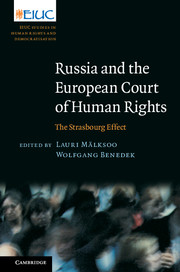Russia and the European Court of Human Rights: The Strasbourg Effect

Russia and the European Court of Human Rights: The Strasbourg Effect
Lauri Mälksoo and Wolfgang Benedek, editors
Cambridge University Press Academic 2017
Why has there been a human rights backlash in Russia despite the country having been part of the European human rights protection system since the late 1990s? To what extent does Russia implement judgments of the Strasbourg Court, and to what extent does it resist the implementation? This fascinating study investigates Russia’s turbulent relationship with the European Court of Human Rights and examines whether the Strasbourg court has indeed had the effect of increasing the protection of human rights in Russia. Researchers and scholars of law and political science with a particular interest in human rights and Russia will benefit from this in-depth exploration of the background of this subject.
- Offers an in-depth analysis of Russia’s relationship with the European Court of Human Rights
- Discusses human rights socialization theories in the empirical context of post-Soviet Russia, as well as nativist theories that offer resistance to the liberal/secular concept of human rights
- Offers a realist and sceptical look at the implementation of judgments issued by the European Court of Human Rights in the biggest Council of Europe member state.
About the Authors
Editors
Lauri Mälksoo, University of Tartu, Estonia Lauri Mälksoo is Professor of International Law at the University of Tartu in Estonia. He is the author of Illegal Annexation and State Continuity (2003) and Russian Approaches to International Law (2015).
Wolfgang Benedek, Institute of International Law and International Relations, Austria Wolfgang Benedek is a former head of the Institute of International Law and International Relations and director of European Training and Research Centre for Human Rights and Democracy at University of Graz.
Contributors Lauri Mälksoo, Dimitry Dedov, Petra Roter, Anton Burkov, Sergei Marochkin, Alexei Trochev, Mikhail Antonov, Bill Bowring, Elisabet Fura, Rait Maruste, Philip Leach, Vladislav Starzhenetskiy, Dmitri Bartenev, Benedikt Harzl, Wolfgang Benedek.